How to invest in blockchain – The emergence of blockchain technology has revolutionized the financial landscape, offering investors a novel and potentially lucrative avenue for diversifying their portfolios. However, navigating this nascent market requires a comprehensive understanding of the various investment options, the associated risks, and the evolving regulatory landscape. This guide delves into the different ways to invest in blockchain, from direct cryptocurrency purchases to blockchain-focused ETFs, equipping you with the knowledge to make informed investment decisions.
What is blockchain technology?
Blockchain technology is a decentralized, digital ledger that securely records information across a network of computers. Its primary purpose is to mitigate the risks of fraud, corruption, and data manipulation by eliminating the need for a central authority. By making verified data accessible to all participants, blockchain ensures transparency and prevents unauthorized alterations.
This technology also streamlines processes that were once inefficient, such as manual record-keeping. Companies like Walmart are utilizing blockchain to track food sources, ensuring safety and traceability. Major corporations like Microsoft, PayPal, Starbucks, Salesforce, and IBM are also leveraging blockchain for various applications, including digital security, infrastructure enhancement, and automation.
How to invest in blockchain
Investing in blockchain technology can be approached in several ways. One option is to invest directly in companies that are integrating blockchain into their operations, as this technology has the potential to streamline their processes and boost profitability. Another approach is to explore the world of cryptocurrencies, either through direct purchases or by investing in cryptocurrency trusts or exchange-traded funds (ETFs) that focus on blockchain-related companies.

For those seeking higher risk and potential reward, participating in initial coin offerings (ICOs) can be anoption. However, thorough research and due diligence are paramount to navigate the volatile nature of cryptocurrencies and identify promising projects. Remember, diversification and starting with smaller investments are key to mitigating risks in this evolving landscape.
Top blockchain ETFs
Amplify Transformational Data Sharing ETF (BLOK)
BLOK is the most prominent blockchain ETF on the market. This actively managed fund selects global companies to develop and apply blockchain technologies.
Top holdings: MicroStrategy Inc (MSTR), Coinbase Global (COIN), SBI Holdings and Galaxy Digital Holdings (GLXY.TO)
Expense ratio: 0.76 percent
Assets under management: $658 million
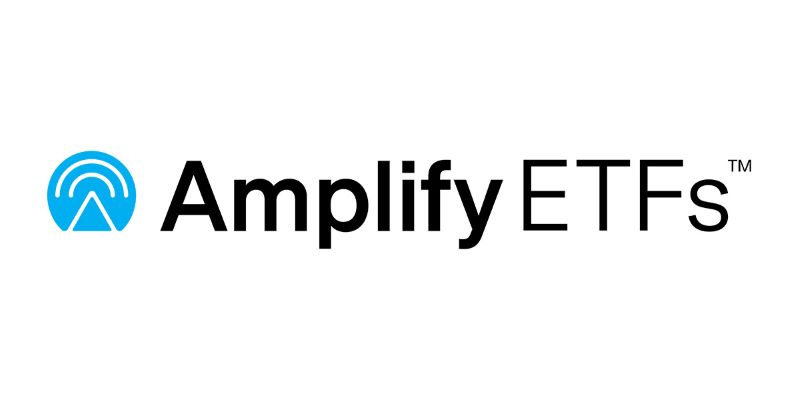
Siren Nasdaq NexGen Economy ETF (BLCN)
BLCN owns global companies supporting the development and research of blockchain technology.
Top holdings: MicroStrategy (MSTR), Coinbase Global (COIN) and NVIDIA (NVDA)
Expense ratio: 0.68 percent
Assets under management: $73 million
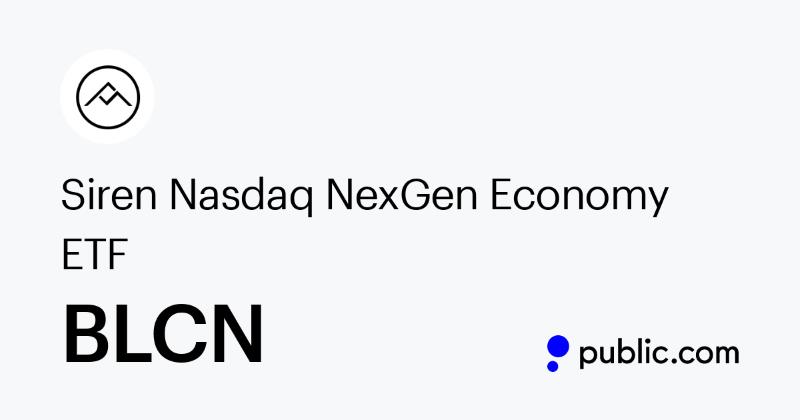
First Trust Indxx Innovative Transaction & Process ETF (LEGR)
LEGR offers exposure to a global portfolio of companies with varying degrees of involvement in the blockchain.
Top holdings: JD.com (JD), Micron Technology (MU) and PayPal (PYPL)
Expense ratio: 0.65 percent
Assets under management: $106 million
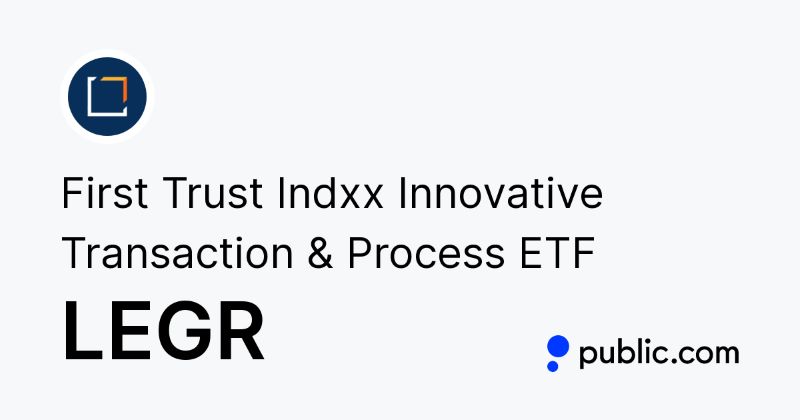
Bitwise Crypto Industry Innovators (BITQ)
BITQ holds an index of 30 crypto companies from around the globe. Some of these names derive more than 75 percent of their revenues from crypto assets.
Top holdings: Coinbase Global (COIN), MicroStrategy Inc (MSTR), Marathon Digital Holdings (MARA) and CleanSpark (CLASK)
Expense ratio: 0.85 percent
Assets under management: $122 million
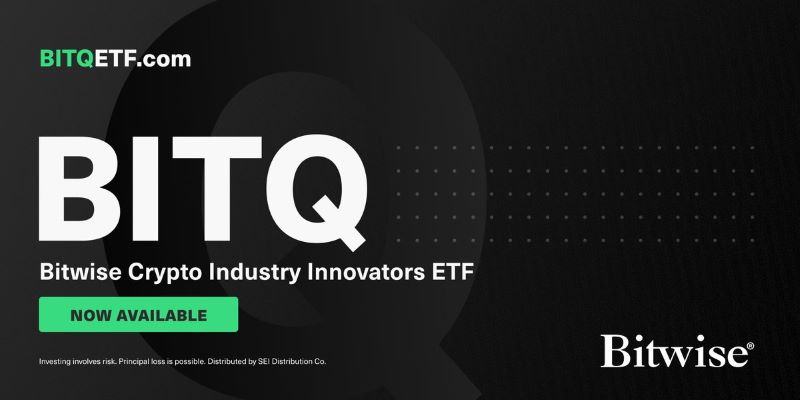
Global X Blockchain ETF (BKCH)
BKCH invests in global companies participating in blockchain activities like digital asset mining and integration.
Top holdings: CleanSpark (CLSK), Coinbase Global (COIN), Marathon Digital (MARA), Riot Blockchain (RIOT) and Hut 8 Mining (HUT.TO)
Expense ratio: 0.50 percent
Assets under management: $136 million
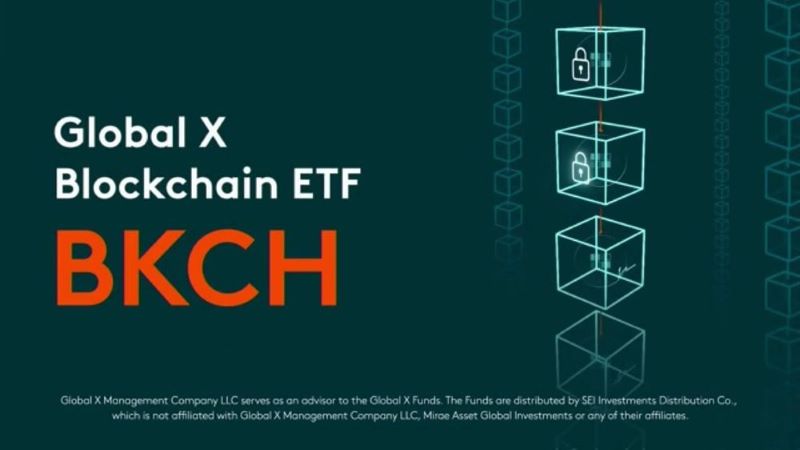
Cryptocurrency vs. Blockchain ETFs: How these investments differ
Investing in digital currencies offers a few different avenues, including Bitcoin ETFs, crypto exchanges, and traditional brokers. Bitcoin ETFs provide a familiar investment vehicle for those comfortable with traditional exchanges. For those seeking direct ownership of cryptocurrencies or futures contracts, specialized crypto exchanges like Coinbase and Binance offer a dedicated platform. Additionally, established brokers like Charles Schwab and Interactive Brokers provide access to Bitcoin futures contracts, offering a more regulated and accessible option for investors.
Risks associated with emerging technologies
Emerging technologies like blockchain present a compelling investment opportunity, but it’s important to be aware of the associated risks. Similar to other thematic investments, blockchain ETFs can be subject to market-related volatility, such as fluctuations in valuations or investor sentiment.
Additionally, regulatory uncertainties pose a significant risk, as demonstrated by the skepticism surrounding Bitcoin from authorities and investors. This uncertainty translates into heightened volatility in the cryptocurrency market, making it challenging to assess the value of Bitcoin and other digital assets.
For both seasoned and novice investors, evaluating the long-term potential of cryptocurrencies remains difficult due to the lack of established valuation metrics and the evolving regulatory landscape. Therefore, caution and thorough research are essential when considering investments in this space.
In conclusion, investing in blockchain is not a one-size-fits-all endeavor. It requires a strategic approach, careful consideration of risk tolerance, and a willingness to adapt to a constantly evolving market. By staying informed, diversifying your portfolio, and conducting thorough research, you can position yourself to capitalize on the potential of this transformative technology. For the latest insights and expert analysis on blockchain and cryptocurrency investments, turn to Forex Trend News.

